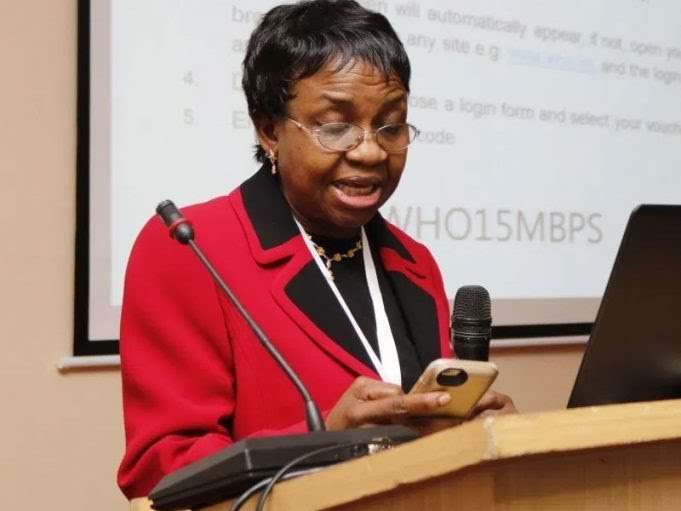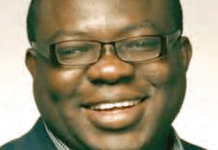
As the African Region of the International Human Rights Commission (IHRC) compiled its list of nominees for the 2023 IHRC New Year Honours, it singled Prof. Mojisola Adeyeye out for a special award: “Africa’s Mother of Pure Food and Drugs”. Apparently, the honour was meant to celebrate her monumental accomplishments as the director general of the National Agency for Food and Drugs Administration and Control (NAFDAC). It was also to acknowledge the fact that she had, for several years, used her wealth of knowledge, experience and expertise to safeguard populations around the world from illnesses and the health hazards of unsafe drug and food products.
Interestingly, whether or not the IHRC took cognisance of the deeper implications of the word “mother” in describing Adeyeye’s strides as a pharmaceutical scientist and DG of NAFDAC, it is incontrovertible that the concept has been a fundamental driving force for Adeyeye over the years. Her research and philanthropic interests, as well as the extraordinary successes she has recorded in her multidimensional exploits, have been propelled by such profound concern, passion and vigour that only a matriarch could muster.
NAFDAC resuscitation and repositioning
When Adeyeye took over the leadership of NAFDAC in 2017, she met a “dying” agency, where directors and regulatory officers lacked such basic working tools as laptops, and where up to 80 per cent of laboratory equipment was comatose. Tasks were mainly executed manually and inefficiently, leading to a massive backlog of over 6000 product applications pending approval. Worse still, as is common with most government agencies, a lot of spending was being done without budgeting and, expectedly, the agency was perilously indebted. Essentially, the NAFDAC she inherited was like a very sickly child that was on the verge of losing the battle to the various infirmities that plagued it.
Naturally, Adeyeye’s sagacious maternal instincts and administrative acumen kicked in. Despite the fact that she was operating under a system that was discouragingly laidback and infested with corruption, she got down to work with charismatic candour and the determination to reposition the agency. She activated a number of mechanisms, policies and strategies that would ultimately revolutionise every aspect of NAFDAC’s operations.
Adeyeye refocused the agency to be a Standard Operating Procedure-driven organisation that prioritises international standards and best practices. Within a short time, many of its processes had been digitalised, leading to unprecedented efficiency and the rapid clearing of applications backlog. She also instituted a culture of fiscal responsibility by controlling expenditure and cutting down wasteful spending, such that its mammoth debt was soon paid off and the agency was brought back to solvency.
Adeyeye envisioned and implemented a robust governance structure and regulatory backbone for NAFDAC, by building a team of well-trained, disciplined and motivated workforce. As well as updating the agency’s regulations and guidelines, she changed the culture of NAFDAC to a customer-focused and an agency-minded establishment. She sharpened the agency’s focus on increasing access to quality and efficacious medicines through local manufacturing. She also helped in strengthening the local pharmaceutical companies by providing guidelines for compliance with international best practices.
Adeyeye also continues to steer NAFDAC to lead by example in imbibing a culture of self-audit, as part of WHO-Global Benchmarking requirements and in line with international best practices. Consequently, as a result of the agency-wide training in quality management systems, NAFDAC was ISO 9001:2015 Certified in June 2019.
Not one to rest on her oars, Adeyeye successfully led her indefatigable NAFDAC team attain WHO Maturity Level 3 (ML3) rating in 2022. The rating, which was achieved much faster by Nigeria than many other African countries, certified NAFDAC as having been found to “function well, stable and eligible for inclusion into the transitional WHO Listed Authorities (WLA).” Adeyeye also recently announced that NAFDAC’s vaccine laboratory will be ready in the next few months, adding that the agency is also working assiduously to attain WHO’s ML4 rating.
Moreover, knowing the wide acceptability of herbal medicine among the larger population of Nigerians, Adeyeye instituted measures to standardise herbal medicines production, marketing and consumption in the country. She inaugurated the Nigerian Herbal Medicine Product Committee (HMPC) as a means of fostering research involving herbal practitioners and academic researchers while their intellectual properties are protected.
Adeyeye currently serves as the chairperson of the Steering Committee of the African Medicines Regulatory Harmonization (AMRH) and the WHO-based Global Paediatric Regulatory Network. She represents NAFDAC on the International Coalition of Medicines Regulatory Authorities (ICMRA) and has been invited to be on the WHO Regional Expert Advisory Committee on Traditional Medicine for COVID-19.
Lifelong devotion to maternal care
As previously hinted, long before Adeyeye became a NAFDAC matriarch and rightly named “mother of pure food and drugs”, she had been a devoted mother to her multitudes of academic and “humanitarian” children.
The lifelong mother once declared, “Just bring a child and you will melt me. I love children a lot because if there are no young people, we won’t have a future.” It is noteworthy that before her appointment as NAFDAC boss, she was the founding chairperson of Biopharmaceutical Sciences and a professor of Pharmaceutics, Manufacturing Science and Drug Product Evaluation at the College of Pharmacy, Roosevelt University in Schaumburg, Illinois, USA, where she spent seven years. She was also a professor of Pharmaceutics and Manufacturing for 21 years at Duquesne University in Pittsburgh, Pennsylvania, USA.
However, quite remarkably, much of Adeyeye’s decades of experience in pharmaceutical material science testing and preformulation, quality drug development, clinical trials, and associated regulatory requirements, has been particularly focused on children, youths and mothers. It was on this basis that she founded Elim Paediatric Pharmaceuticals, in Rolling Meadows, Illinois, USA, with the purpose of developing quality drug products for children’s diseases, including rare and neglected illnesses. Also, with the support of Duquesne University, she was able to develop an anti-retroviral (HIV/AIDS) paediatric fixed-dose combination and received intellectual property on the formulations in the UK and South Africa.
Adeyeye also founded the Drugs for AIDS and HIV Patients (DAHP) – an NGO that focuses on preventing HIV/AIDS among Nigerian youths, as well as prevention of mother-to-child transmission and care for orphans and vulnerable children. She is also the founder of Sarah Extended Family Homes for Children, a home that caters for children from kindergarten up to university level.
Background and recognitions
Professor Mojisola Christianah Adeyeye was born on 29 May, 1951 in Ifewara, Osun State. She obtained her bachelor’s degree in Pharmacy, from University of Nigeria, Nsukka, in 1976. She migrated with her family to the United States in 1982 and subsequently obtained her master’s and doctorate degrees from the University of Georgia. She has five patents, 65 peer-reviewed manuscripts, book chapters and books, and more than 140 scientific presentations.
Adeyeye has received numerous awards and recognitions for her exceptional contributions to pharmaceutical science and scholarship. She is the First African Woman Fellow, American Association of Pharmaceutical Scientists (AAPS).
She is also a Fellow of the Nigeria Academy of Science, the Nigeria Academy of Pharmacy, as well as being an Academic Research Fellow of the American Association of Colleges of Pharmacy (AACP). She was listed in the Marquis Who’s Who of American Women, 1991/1992 and was awarded the J. William Fulbright Scholar Award for African Regional Research Program on AIDS and AIDS-Related Research from 2004 to 2005.










